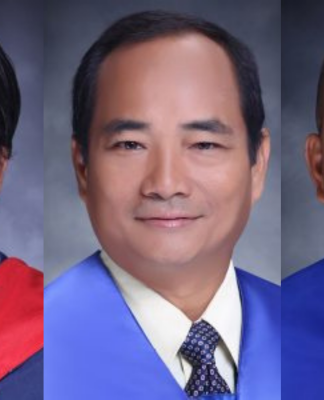For this Thomasian with cerebral palsy, struggling with the disability makes him special not because he is physically different, but because his condition is a blessing from God.
But this positive attitude did not come. When Dennis Antonio Ilagan, vice president of the Cerebral Palsied Association of the Philippines (CPAP), was first offered to lead the organization in 1996, he declined. He refused to mingle with other disabled persons. “I did not want to be associated with them,” he admitted. Although afflicted with the disease, he felt and believed he was a normal person because on top of the normal treatment everyone gave him, he had endured rehabilitation and years of painful therapy sessions. But the group was persistent and in the end, Dennis gave in.
Despite the apprehension and uncertainty of what lay before him, Dennis patiently went through every seminar and meeting he had to attend in order to familiarize himself with his new job. After much interaction with his fellow disabled, his notions about disability changed. He found it fulfilling to be instrumental in helping his fellow handicapped and realized that ignoring them was a mistake. He found solace among the people he vehemently rejected.
Normal
Dennis finished AB Economics at the Faculty of Arts and Letters in 1986. The sixth among a lawyer-couple’s brood of seven, the young Dennis did not show the signs of a baby’s normal development such as sitting up on his own and crawling. When he was one year and eight months old, Dennis’s parents brought him to the hospital where he was diagnosed to have cerebral palsy, of chronic condition affecting body movements and muscle coordination. It is caused by damage to a specific area in the brain, usually occurring during fetal development or infancy.
Though saddened, his parents did everything to help their son live a normal life. Eventually, Dennis underwent rehabilitation and attended special education class. At age five, an operation at the back of his knees and groin enabled him to walk, thus permitting him to attend normal schooling.
Dennis first learned of his condition when he was eight, during his second grade at Lourdes School of Quezon City where he also finished elementary and high school. He was given extra time during exams because he wrote slowly, and would often be used as an example. “My teachers would say, ‘Tingnan n’yo si Mr. Ilagan, kahit ganyan pumapasok pa rin,” he fondly recalled.
College proved more difficult for Dennis. It was at this point when inferiority complex crept in Having come from an all-boys’ school, the female-dominated Faculty of Arts and Letters made him more anxious and aloof. “Naninigas talaga ako nun, hindi ako sanay,” he said.
Nonetheless, Dennis came out of his shell. Gradually, he made friends and soon found himself going out with his classmates. Like his normal classmates, he experienced the joys and pains of a college student. He flunked exams, bribed teachers with food, and listened to the egoistic musings of professors.
Independent
Overall, Dennis described his stay in UST as fun. He never felt discriminated against and his Thomasian upbringing even helped him become more independent.
After college, Dennis started working for his father. In 1990, he joined a Catholic organization called Neocathecuminal Way. He said the organization made him realize God has for him a certain mission. His inferiority complex lessened and he began to see things in a different light.
Dennis was the first president of the Cerebral Palsied Association of the Philippines. Founded in 1993, the CPAP is a non-government organization that aims to promote awareness, protect the rights, and provide assistance to persons with the disease. As part of his work for CPAP, he has spoken on television shows and traveled to various provinces to discuss their cause.
Dennis said he used to view the wheelchair negatively. But his first two years in CPAP greatly affected his outlook in life and his partner, the wheelchair. On a two-week seminar he attended in Japan, he learned that instead of seeing it as a burden, the wheelchair should be seen as something that helps him go places faster with less effort. His shame to use his wheelchair disappeared.
Aside from fulfilling his duties as vice president of CPAP, Dennis also works as his father’s legal secretary and undergoes training to become a medical transcriptionist. If he’s not working, he plays Bosha, a sport played like marbles and designed for handicaps.
His girlfriend, also cerebral palsied, keeps him happy along with his supportive family. Dennis affirmed that family support is vital to the development of cerebral palsied children. “It is good to give support but parents should also learn to let go,” he said. “Cerebral palsied children should earn the trust and respect of normal people and learn to be independent.” He also advises parents to let their children be. “Wag kayong matakot. Tingnan n’yo kung ano yung talents [ng anak ninyo], focus on them and develop them,” he added.
On the other hand, he pointed out Republic Act 7277, which gives equal opportunities to the handicapped. “Sana wag kami i-discriminate, tingnan lang yung kakayahan [namin] and wag mag-focus on the negative kundi sa positive,” he added.
At 41, Dennis is content and sees each new day as another opportunity to serve God. “I leave everything to Him,” he said. Easing one’s own qualms is indeed one tough test. Dennis, as one who has survived it all, is proof that anything is possible with faith and perseverance.















